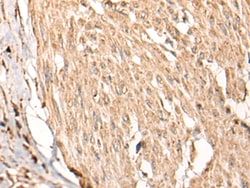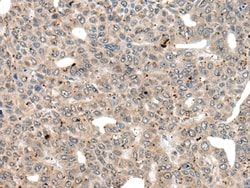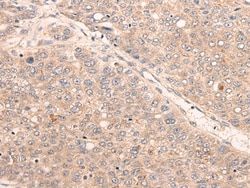CRYGS Polyclonal Antibody, Invitrogen™
Manufacturer: Thermo Scientific
Select a Size
| Pack Size | SKU | Availability | Price |
|---|---|---|---|
| Each of 1 | PIPA568412-Each-of-1 | In Stock | ₹ 46,502.50 |
PIPA568412 - Each of 1
In Stock
Quantity
1
Base Price: ₹ 46,502.50
GST (18%): ₹ 8,370.45
Total Price: ₹ 54,872.95
Antigen
CRYGS
Classification
Polyclonal
Conjugate
Unconjugated
Gene
CRYGS
Gene Alias
AI327013; Beta-crystallin S; beta-crystallin S-like protein; CRYG8; CRYGS; crystallin gamma S; crystallin, gamma 8; crystallin, gamma polypeptide 8; crystallin, gamma S; CTRCT20; Gamma-crystallin S; gamma-crystallin S; beta-crystallin S; gamma-S-crystallin; gammaS-crystallin; opacity due to poor secondary fiber cell junction; Opj; recessive nuclear cataract; rncat; unnamed protein product
Host Species
Rabbit
Purification Method
affinity chromatography
Regulatory Status
RUO
Gene ID (Entrez)
12970, 1427
Content And Storage
-20°C
Form
Liquid
Applications
Western Blot
Concentration
1.2 mg/mL
Formulation
PBS with 40% glycerol and 0.05% sodium azide; pH 7.4
Gene Accession No.
O35486, P22914
Gene Symbols
CRYGS
Immunogen
Full length Fusion protein of human CRYGS
Quantity
100 μL
Primary or Secondary
Primary
Target Species
Human, Mouse
Product Type
Antibody
Isotype
IgG
Description
- Predicted to react with Human samples
- Crystallins are separated into two classes: taxon-specific, or enzyme, and ubiquitous
- The latter class constitutes the major proteins of vertebrate eye lens and maintains the transparency and refractive index of the lens
- Since lens central fiber cells lose their nuclei during development, these crystallins are made and then retained throughout life, making them extremely stable proteins
- Mammalian lens crystallins are divided into alpha, beta, and gamma families; beta and gamma crystallins are also considered as a superfamily
- Alpha and beta families are further divided into acidic and basic groups
- Seven protein regions exist in crystallins: four homologous motifs, a connecting peptide, and N- and C-terminal extensions
- Gamma-crystallins are a homogeneous group of highly symmetrical, monomeric proteins typically lacking connecting peptides and terminal extensions
- They are differentially regulated after early development
- This gene encodes a protein initially considered to be a beta-crystallin but the encoded protein is monomeric and has greater sequence similarity to other gamma-crystallins
- This gene encodes the most significant gamma-crystallin in adult eye lens tissue
- Whether due to aging or mutations in specific genes, gamma-crystallins have been involved in cataract formation.



